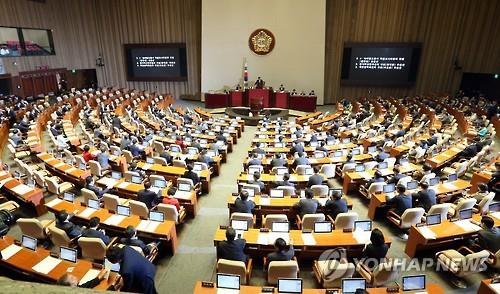- California Assembly OKs highest minimum wage in nation
- S. Korea unveils first graphic cigarette warnings
- US joins with South Korea, Japan in bid to deter North Korea
- LPGA golfer Chun In-gee finally back in action
- S. Korea won’t be top seed in final World Cup qualification round
- US men’s soccer misses 2nd straight Olympics
- US back on track in qualifying with 4-0 win over Guatemala
- High-intensity workout injuries spawn cottage industry
- CDC expands range of Zika mosquitoes into parts of Northeast
- Who knew? ‘The Walking Dead’ is helping families connect
19th Nat’l Assembly wraps up last meeting

Lawmakers sit for the last regular session of South Korea’s 19th National Assembly in Seoul on May 19, 2016.
SEOUL, (Yonhap) — South Korea’s 19th National Assembly held its last regular session on Thursday, passing some last-minute bills and paving the way for the newly elected lawmakers whose term begins at end-May.
Among the bills passed on Thursday was the so-called Shin Hae-chul law, named after a popular South Korean singer who suffered a sudden heart attack in 2014 and fell into a coma shortly after being treated for an infection of the peritoneum and intestines at a Seoul hospital.
The law centers on protecting patients from medical-related accidents, allowing the Korea Medical Dispute Mediation and Arbitration Agency to kick off conciliation for such disputes even without the approval of medical practitioners.
The lawmakers also passed a law on establishing a carbon industrial zone in North Jeolla Province, in line with the effort to seek shared growth among different regions of the country.
The parliament moreover passed a law to allow citizens to change their resident registration numbers if they are exposed to physical or financial threats due to the leakage of their personal information.
The assembly then gave a nod to the Korean National Police University’s plan to open a new graduate school to foster experts to deal with violent crimes and terrorist attacks.
Any kindergartens with a child abuse case will immediately be shut down, the National Assembly added, passing a revision of the law on the education of preschoolers.
The revision bans any form of corporal punishment of toddlers and obligates educators to follow South Korea’s constitution and international agreements on children’s rights.
“The 19th National Assembly has shown the potential of the parliament,” said South Korea’s parliamentary speaker Chung Ui-hwa. “The lawmakers have worked hard for the country and the people, but it is hurtful that public opinion on the parliament remains icy.”
“I hope the 20th National Assembly will be one that fears not power, but the people,” Chung added.
The 19th National Assembly, however, failed to settle other key outstanding legislation, including the abolition of the bar exam.
South Korea had adopted the law school system in 2009 as an alternative to the bar exam to give more people a chance at a law career regardless of their academic background. But the switch has also come under fire, as only the wealthy can afford the high tuition of law schools.
It also failed to pass a bill related to class-action suits against corporations, which was sparked by the case of deadly humidifier disinfectant sold by Oxy Reckitt Benckiser.
The humidifier disinfectant case, one of the worst scandals involving a consumer product, came to light after four pregnant women died from unknown lung problems in 2011. South Korea confirmed 221 people as victims. Out of 90 deaths, 70 are believed to have been caused by Oxy products.












